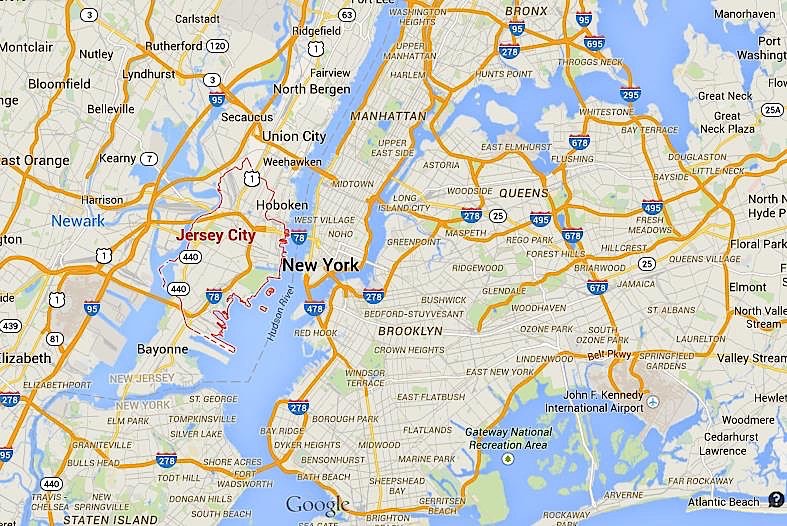Jersey City, New Jersey is one of the most populous cities in the entire state. In fact, only Newark has more people living in it. Jersey City is considered part of the New York Metropolitan area, and currently serves as a vital transportation terminus for the Port of New York and New Jersey. With its close proximity to Manhattan, financial and service industries have played a very important role in shaping the entire Jersey City real estate market.
Just across the Hudson River from New York City, Jersey City owes a lot of its success to its close proximity to the City That Never Sleeps. The Jersey City housing market is home to many commuters that work in New York, and serves as a getaway for those looking for a “smaller” city feel. In fact, about 257,342 people call Jersey City home. Overflow from the expensive New York market should continue to supply Jersey City with plenty of demand.
The Jersey City real estate market has seen the average home price reach $441,139. However, with an average sold price of $340,834, actual home values are 29.4 percent higher than local sales prices. The average price per square foot breaks down to about $357. The Jersey City real estate market is strongly in favor of sellers at the moment, as property is in very high demand. Not only that, but homes are selling faster whether they are overpriced or not. Sellers receive multiple offers and the price is usually bid up above the seller’s initial asking price. With the rate homes are selling for, the typical mortgage in the Jersey City housing market is $2,792 a month.
Real estate in Jersey City is only a part of the 2,568,923 properties and 66,935 homes for sale in the entire state. As a result, the average home price and average home value of Jersey City also impacts the average home price ($147,289) and average sale price ($329,071) of New Jersey. That said, Jersey City real estate actually increases the statewide average.
The Jersey City real estate market is expected to receive a lot of support from the local job sector. Unemployment, while above the national average, is on the mend and improving. Unemployment in Jersey City, according to Realtor.com, has reached 6.1 percent. That said, local unemployment is less than the county (6.3%) and the rest of the state (6.2%). The national unemployment level is 5.4 percent. However, good news is on the horizon. J.P. Morgan Chase & Co. is looking to move 2,150 jobs from New York City to Jersey City. Other large companies may follow closely behind, as New Jersey has awarded more than $5 billion in corporate tax subsidies since Chris Christie first took office in 2010.
No more than a year ago, J.P. Morgan was awarded a $225 million tax credit to create 1,000 jobs in Jersey City and to retain 2,612 positions. Tax incentives have made it possible for Jersey City to attract financial powerhouses like RBC Capital Markets, Principis Capital LLC, New York Life Insurance Co., Brown Brothers Harriman Co., Fidelity Global Brokerage Group and Jackson Hewitt Inc.
The recent influx of financial sector jobs has had a huge impact on the Jersey City housing market. They are also responsible for chipping away at the unemployment level.
Anyone interested in Jersey City real estate investing will appreciate the shear volume of foreclosures in the local market. According to RealtyTrac, there are approximately 1,621 foreclosures in the Jersey City housing market. In all, the number of local foreclosures dropped by as much as 41 percent in the last month, but increased 73 percent over the course of a year. Otherwise known as distressed properties, these homes are either in default, bank-owned, or scheduled to be placed up for auction.
Auction homes account for the largest increase in today’s foreclosures, as they now represent 50 percent of the Jersey City distressed property market. Perhaps even more impressively, auction homes increased 1,175 percent over the last 12 months. Having increased at a much lower rate (42.2%) in the last year, bank-owned properties only make up about 9.8 percent of the distressed Jersey City market. Pre-foreclosure homes, or those that are simply at risk of being repossessed, dropped about 14.6 percent in the last year. Fewer people actually went into default. However, regardless of the scenario, each of these properties represents an opportunity for the entire Jersey City real estate investing community.
Of course, while availability is important to investors, the discounts these properties offer are perhaps even more attractive. According to RealtyTrac, distressed homes in the Jersey City housing market sell for an average of 44.9 percent less than non-distressed homes. That is a savings of nearly $160,000 per property. Savvy investors should appreciate the spreads these homes offer.
The Jersey City real estate market has come a long way since the recession. Housing prices in the downtown area have seen impressive appreciation rates, and demand continues to rise. According to Zillow, home prices should rise by as much as 4.4 percent over the next year. If demand continues to follow suit, things will only look better than they already are. Moreover, Jersey City real estate looks to receive a lot of support from the local economy. Unemployment looks to be getting better and moves from the local government are adding a lot of jobs to the area. For all intents and purposes, Jersey City real estate investing and average homebuyers should like what they see coming from the area.
Jersey City Real Estate Market Summary:
- Current Median Home Price: $441,139
- 1-Year Appreciation Rate: 13.5%
- Unemployment Rate: 6.1%
- Population: 257,342
- Median Household Income: $58,000
